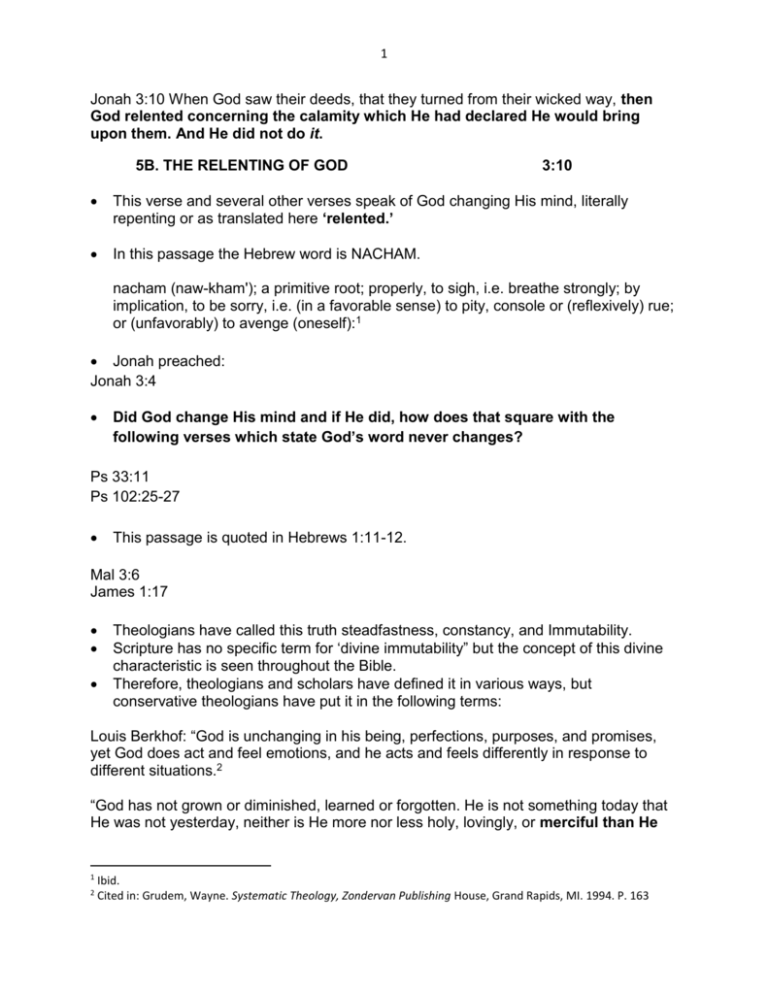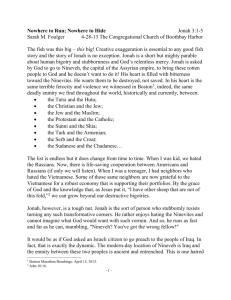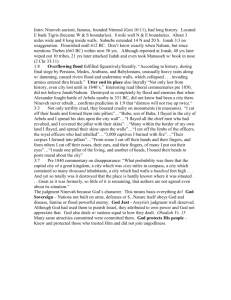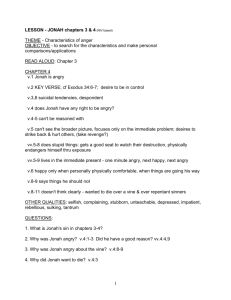Notes Octobrt 19th - Countryside Bible Church
advertisement

1 Jonah 3:10 When God saw their deeds, that they turned from their wicked way, then God relented concerning the calamity which He had declared He would bring upon them. And He did not do it. 5B. THE RELENTING OF GOD 3:10 This verse and several other verses speak of God changing His mind, literally repenting or as translated here ‘relented.’ In this passage the Hebrew word is NACHAM. nacham (naw-kham'); a primitive root; properly, to sigh, i.e. breathe strongly; by implication, to be sorry, i.e. (in a favorable sense) to pity, console or (reflexively) rue; or (unfavorably) to avenge (oneself):1 Jonah preached: Jonah 3:4 Did God change His mind and if He did, how does that square with the following verses which state God’s word never changes? Ps 33:11 Ps 102:25-27 This passage is quoted in Hebrews 1:11-12. Mal 3:6 James 1:17 Theologians have called this truth steadfastness, constancy, and Immutability. Scripture has no specific term for ‘divine immutability” but the concept of this divine characteristic is seen throughout the Bible. Therefore, theologians and scholars have defined it in various ways, but conservative theologians have put it in the following terms: Louis Berkhof: “God is unchanging in his being, perfections, purposes, and promises, yet God does act and feel emotions, and he acts and feels differently in response to different situations.2 “God has not grown or diminished, learned or forgotten. He is not something today that He was not yesterday, neither is He more nor less holy, lovingly, or merciful than He 1 2 Ibid. Cited in: Grudem, Wayne. Systematic Theology, Zondervan Publishing House, Grand Rapids, MI. 1994. P. 163 2 was or will be. He has not added or subtracted, nor diminished in any of His attributes.” Rolland McCune. Augustus Strong: “Immutability must not be confounded with immobility.” 3 One cannot isolate immutability of God from His omniscience. Isaiah 46:10 God Himself does not change but things change around Him. God’s person does not change. Ps 103:17 God does not change in His truthfulness. Num 23:19 Heb 6:17-18 God does not change His purposes. Prov 19:21 Isa 14:24 In light of these passages there other are passages where it says God did change. Gen 6:6 Ex 32:9-10 1 Sam 15:10-11 Isa 38:1-5 Amos 7:3 How do handle these verses where apparently God relented or changed His attitude? There are places in the Bible which talk about conditions that will determine God’s actions. If you will do ‘x’, then I will do ‘y’. Deut 28:1-2 Deuteronomy 28:15 3 There is no change in God’s personage or attributes. Strong, Augustus Hopkins. Systematic Theology. Fleming H. Revell Company, Westwood, NJ. 1967 p. 258 3 Scriptures tell of a change in God’s attitude toward men, but there is no change in God’s being, decree, purpose, or ethical laws. God’s present attitude toward them is expressed in human language in light of the wickedness and rebellion of men. Gen 6:6 1 Sam 15:35 God has not changed, but the unchanging God reacts to the changing attitudes of men. It is like pedaling a bike against a 25 mph wind and then you turn around and go with the wind; the pedaling is easier even though the wind is still blowing at 25 mph. The wind is still the same, you have just changed direction. The same sun melts the wax and hardens the clay. There is a difference between formal decrees which are solidified with an oath and informal decrees having statements of intention. Three examples a formal decree sealed with an oath: Genesis 25:32-34 Jacob is desirous of the birthright and Esau agrees to sell it [informal statement]. Jacob wanted the transform of the birthright to be unconditional so he made Esau swear an oath [formal decree]. Genesis 22:16-18 Psalm 89:3-4 Psalm 89:33-37 An example of an informal conditional decree— Jeremiah 26:3 First of all, the possibility of withholding judgment from the people of Nineveh is not mentioned, explicitly. It appears that even though Jonah’s message was God will destroy the city in forty days, but even Jonah himself understood that God might forgive Nineveh. Jonah knew God was a God of unchanging grace, compassion, and longsuffering, plus forgiveness. So while Jonah was announcing judgment there was a tacit condition in his preaching which was also picked up by the king. Jonah 4:2 4 Note the kings comment— Jonah 3:8-9 The purpose of God was not changed nor was there a change in God’s character. What Jonah saw was a city which was violent, wicked, unrighteous, idolatrous, proud, and living in luxury. On the other hand God saw a city sitting in sackcloth and ashes, humbled, selfabasement, and appealing to God’s mercy and grace. The great moral change in Nineveh made it another city, a new creation. The new Nineveh was not destroyed now, but the latter Nineveh was destroyed. Nah 3:7 John 5:24











